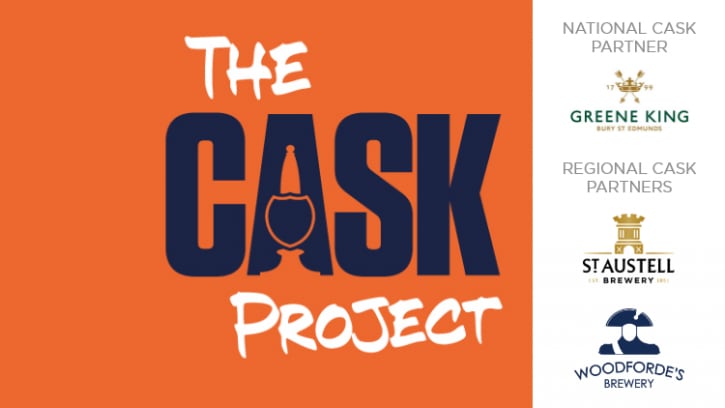Dozens of international media titles across William Reed publishing are joining forces to raise the profile, positives and the pressures of green thinking within the global food and drink sector across September. Share your thoughts on this anonymous, pulse check poll.
Keeping doors open and staff in while tackling sky-costs often feels like the real battle. And with pubs closing at a rate of nearly one a day, who could blame you?
But here’s the thing: going greener doesn’t have to mean spending more. In fact, it can help you save. A recent Morning Advertiser snap poll found that 92% of pub operators are already taking sustainability seriously, with many switching to energy-efficient lighting and investing in smarter equipment for kitchens and cellars.
It’s not just about the bills, either. Your customers care. Recent research suggests more than a third of Brits are happy to pay more for sustainable food and drink options. That means making eco-friendly changes could give your pub an edge, and keep people coming back.
Still, 77% of readers told us they think the sector isn’t doing enough. So how can you step up without breaking the bank? We’ve rounded up 10 ways pubs can cut costs while going green:
1. Team up with sustainable charities

Net zero energy whiskey distillery Cooper King Distillery co-founder Chris Jaume highlights the importance of giving back.
He says: “As a hospitality venue, you’re a business rooted in a community. So people will visit you to have a drink, to eat something, to bring friends. You have an opportunity, almost an obligation, to weave yourself into the fabric of that local community. You are doing that by providing a nice place for people, but you can also use some of the proceeds from the business to give back.
“We give 1% of our turnover to Yorkshire Dales Millennium Trust, a local environmental charity, and they have a huge impact on the community across the county, Through them, we plant a meter square of woodland for every bottle of gin we sell, and we’re donating £1 for every bottle of whiskey sold, to fund apprenticeships for young people in rural North Yorkshire.
“You’re actually benefiting communities far wider. And there’s a potential financial upside. Obviously, there’s a cost to donating a percentage of your turnover, but we’ve actually attracted even more customers through our doors because of that sustainable ethos.”
2. Communicate clearly

Specialist sustainability communications agency founder Rosie Davenport says: “Embracing sustainability can increase loyalty and trade, but only if pubs communicate their efforts effectively. Many operators are missing out on converting their actions into sales. “Pubs can get started with easy wins like using chalk boards and menus to explain progress and future goals. However, it’s vital to avoid vague phrases like ‘we’re doing our bit for the planet’ or ‘we’re going green’, which are meaningless without specifics.
“It’s more effective to talk to customers about what’s been achieved and make them feel part of the solution. For instance: ‘Our wine on tap range has helped reduce packaging waste by 50%.’
“Being honest about where there’s room for improvement also drives credibility. Pubs need to tell their story accurately and authentically. Regular updates can help, so saying, ‘we’re not zero-waste yet, but we’ve reduced our kitchen waste by 35% and are working on composting next’.”
3. Question everything

Little Mercies in Crouch End, north London was previously named Sustainable Bar of the Year in the Top 50 Cocktail Bars.
Owner Alan Sherwood says: “The past couple of years have shown there’s a trend towards much more minimal cocktails. I like to call it liquid focused. For us, it’s always been, ‘this is the best liquid we can make, and that’s what you’re drinking.’
“That lends itself easily to a level of sustainability, because you inherently question things, and that’s a good starting point. We went through our classic cocktails and, in a very brutal way, just went, ‘is this garnish necessary? Does this lemon wedge do anything? ’ And for a lot of them, the answer is no. If you go back to really old school classic cocktail recipes, it’s there because fruit was a scarce commodity, and it spoke of luxury. But just because it’s the way it’s been done before doesn’t necessarily mean it’s the right way.
“Citrus fruit in drinks is such a ubiquitous thing, but part of the questioning is, ‘do I want this to be lemon flavoured, or am I using lemon because it’s acidity in a convenient form?’ A good example would be our Moro Margarita. We looked at the classic recipe, and thought, if it has that incredible orange flavour, is the lime just getting in the way?
“Blood oranges are only available in December, so we preserve them in salt. This means there’s only one shipment, and we get a fruit that will last for years. We distil the preserved citrus into a tequila, then we add citric acid, sugar, and a bit of salt. Because we’re not using lime juice, we cut out the waste or the shipping that’s involved in that fruit, but we also end up with a much cleaner product.”
4. Engage staff

Getting teams on board is key, according to Claire Chalmers, chief revenue officer of food data platform Nutritics.
“Your staff are the closest to daily operations. To customers, they are the real representation of your brand values. When teams feel on board with sustainability initiatives, progress is faster. Where we see real traction is when employers actively empower their staff to suggest their own sustainability improvement ideas,” Chalmers says.
“In these instances, operators are fostering a workplace that employees are proud to be part of, and our research bears this out: nearly half (47%) of leaders think their staff engage well with sustainability practices.
“Transparency is key – by openly sharing sustainability initiatives with employees, operators can build trust, strengthen brand loyalty, and demonstrate a genuine commitment to lasting change, whilst successfully balancing profitability with their environmental responsibilities.
“No site has to be ‘perfect’ in the eyes either of the guest or the staff. Simply knowing and trusting that the operator is meeting the sustainability pledges they have committed to is a strong position to be in.”
5. Stock cask

The most sustainable way of drinking beer in the UK is consuming cask, outlines Gloucestershire-based business Stroud Brewery managing director Greg Pilley.
The organic beer producer boss outlines how being aware of how the drink is made can boost sustainability credentials further.
Pilley says: “Cask is our cultural adaptation to producing a beer in our climate, pre industrial times, without so much transport, without chilling and without the use of CO2. It has evolved over quite a long time to meet both our taste and our cultural needs, so it is the obvious answer.
“The most sustainable way of drinking beer in the UK is to drink cask, and then is to drink that cask made fairly locally and in your local pub. Even better, is to drink a cask beer that is produced using agricultural techniques that are sympathetic to the environment.
“When choosing a brewery to work with, you can look out for ‘organic’ labels or B Corp accreditation. If a brewery has gone as far as offsetting or insetting, and producing a carbon neutral beer, then that is a claim worth noting.
“The most powerful thing we can do is make sure that we spend our money in the right places and with the businesses that are trying to make change. If we do that, then we move towards a better world. And that’s true of businesses who are choosing suppliers.
“It’s all too easy just to look for the cheapest because the economy is difficult; there’s that tension between cash and people’s values. But then we’ve just got to do a better job of expressing those values and why it’s important. For us, it’s about working with pubs that really get it, that can tell that story, and who can attract customers that are willing to spend that extra 10p a pint.”
6. Switch to a green energy supplier

Ensuring your energy is coming from a green supplier is “the best thing a bar or restaurant could do”, according to Matthew Hastings, brand ambassador and blender of B-corp certified Nc’nean whisky distillery, Drimnin, Scotland.
“Changing your energy supplier to a green energy supplier is the biggest thing that you can do that takes the least amount of work and will have the biggest impacts on the sustainability of the country,” he outlines.
“The more green energy tariffs that are taken on by more people, the more money is invested into Green Energy Solutions for the country. So take an hour or two of your time to use Which?, and look up green energy tariffs.
“It would be the best thing a bar or restaurant could do, because it has very little impact on the working day, and there would be zero change outwardly from the bar, but it’s using your money and using your wallets to pay for better things for the planet.”
7. Source local

Planning ahead, growing your own ingredients and sourcing other products from nearby businesses are just three tips from Kay Chandler, co-owner of the Estrella Damm Top 50 Gastropubs One to Watch 2025, the White Hart, Fyfield, Oxfordshire.
“We’ve got a big kitchen garden, and we plan early in the year what to grow. It’s not just veggies and fruit… we’ve got lavender, rosemary, bay leaves, sage, all sorts," the operator explains.
“Not everybody has the whole space to have a whole garden like we do, but you can start small by growing a little garnish for your gin and tonics.
“How many pubs do you go to and someone picks your garnish from the garden? So it’s made into a selling point, but also it’s training the team and saying, ‘it’s also cool because we are doing our bit to help the environment.’
“If you’re clever about what you’re growing, the garden can save you money. Courgette flowers are really expensive if you buy them, but at the moment they grow really quickly. It’s also a great marketing tool, and it’s great to build trust with the customer, because they know we have high standards and we’re sustainable.
“You could also take the team on a foraging trip. Blackberries are in hedgerows everywhere, elderflowers are everywhere, and by telling them why it’s important, you’re engaging the team – they’re excited, and they’re telling the customer.
“Everything we can source locally, we do. All our local farms and suppliers, we’ve known them for years, and they all share the same ethos we have. The taste is great, and you’re reducing the transportation and lorry cost, and the emissions associated with that.”
8. Reduce kitchen waste

The Loch & The Tyne in Old Windsor, Berkshire, which is part of the Adam Handling Group, was the Estrella Damm Sustainable Pub of the Year in 2024 on the Top 50 Gastropubs list.
Sustainability has always been part of the group’s ethos with its venue’s feature produce that has been foraged, while utilising as many part of ingredients as possible is also top of the agenda.
Restaurant director George Hersey advises on how other operators can cut down on waste, particularly back of house.
“A top tip is to put see-through bins on stations, and question everything going in. We don’t just do that in terms of wanting to save the planet at the Loch & Tyne, we do it because we want to make sure staff are hitting their GPs as well as understanding food costs,” he says.
“Zero waste is an impossible task, but what we do is stretch every ingredient to the nth degree. Always think about every single thing. At the moment, whatever gets to the final stages in the kitchen goes to the bar. For example, when we use bones, we use that bone marrow for our steak, then we give the bar bones from the bone marrow, and they infuse that into a vodka for a bone marrow martini.
“Using the whole animal is a really important thing we do. Every few weeks, there’s either a whole deer, or a whole pig or whatever. We break it down, we then showcase that through the menu. This could look like handmade venison sausages, a venison Ragu, and a venison haunch, and we’ll have them all on as specials and different bits and bobs.
“It’s not just to showcase the ingredient, but also to utilize every part of it, and make something exciting and fun. But we don’t want things to seem any less luxury or delicious than they are, saying it has to be ‘waste’, because all we’re doing is utilizing the whole animal. It doesn’t mean that one part of that animal is better than the rest.”
9. Add £1.50 to every bill

Putting a voluntary donation onto bills is one way in which the award-winning Riverside at Aymestrey helps spread awareness of sustainability.
Chef-patron Andy Link of the country pub, which was named Best Sustainable Pub at the 2022 Great British Pub Awards, lays out where the donations go and the impact it’s had on his business.
“Three and a half years ago, we launched our carbon zero initiative, which is, we add £1.50 to every guest bill. It’s completely voluntary, but it gets stored up, which raises around £15,000 a year that we donate to specific local environmental projects," he explains.
“We’ve invested £5,000 this year to a nature reserve locally, and partnered with Herefordshire Wildlife Trust. We planted orchards – around 500 to 600 fruit and nut trees – we’ve invested in our local hedgehog charity. We’ve tried to think of every thing we could do to have a positive impact on our local area.
“This works for rural and inner city venues, in a sense, because that fund’s also gone toward two primary schools to teach kids about nature, and we’ve donated just over £1,000 for them to start their own garden.
“Pubs are perfect because we’re customer facing, so we’re a good outlet to kind of sing about sustainability and promote good local suppliers. Although it’s been amazing to take our staff to the nature reserve we’ve funded, it’s great for our customers to see, ‘if we eat there and we spend our money there, some of it’s going towards good causes.’
“I wouldn’t necessarily recommend every single pub just add £1.50 to every bill, but I would say that everybody should look at how they can partner and generate funds for their local community projects.”
10. Check equipment

Keeping equipment in tip top shape can help reduce energy usage, according to Heineken UK on-trade director Will Rice.
He adds: “In the short term, simple maintenance on current kit can make a difference, such as checking that seals on fridges, freezers, and ovens are intact to improve energy efficiency.
“In the cellar, operators should focus on insulation to avoid overworking cooling systems, especially in warmer months. Checking the cellar is the correct size for the bar and amount of stock ensures empty spaces aren’t being unnecessarily chilled, which is also an energy drain.”




